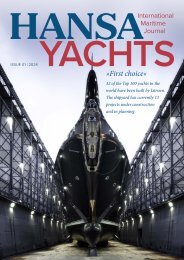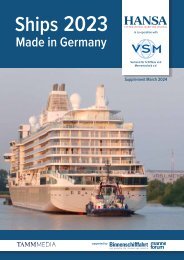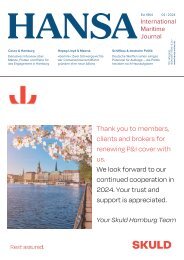HANSA 07-2022
RoLo-Neubau · ISF-Tagung · Stena Bulk · Abwasser · Bergung · Schlepper-Wettbewerb · Schiffsmakler-BBQ · Schifffahrtsessen 2022 · 130 Jahre Hurtigruten · Louis Dreyfus
RoLo-Neubau · ISF-Tagung · Stena Bulk · Abwasser · Bergung · Schlepper-Wettbewerb · Schiffsmakler-BBQ · Schifffahrtsessen 2022 · 130 Jahre Hurtigruten · Louis Dreyfus
Sie wollen auch ein ePaper? Erhöhen Sie die Reichweite Ihrer Titel.
YUMPU macht aus Druck-PDFs automatisch weboptimierte ePaper, die Google liebt.
SCHIFFFAHRT | SHIPPING<br />
Guest Commentary: Erik Hånell, President & CEO, Stena Bulk<br />
Recognising adaptability as an<br />
important asset in the tanker market<br />
Typically, we think of our crews, vessels, and partners as assets,<br />
but the current market conditions for tanker operators remind<br />
us of a less tangible asset – our flexibility. If the last few years –<br />
marked by public health threats and geopolitical conflict – have<br />
taught tanker operators anything, it is that having flexibility and the<br />
ability to adapt to unexpected events is a corporate asset worthy of<br />
recognition and cultivation.<br />
»There is overcapacity in the global fleet. This is<br />
further complicated by the return of tonnage that<br />
had been earmarked for floating storage«<br />
The tanker market is currently witnessing low global commercial<br />
and strategic storage capacity, in part driven by oil producing<br />
nations cashing in on expensive crude prices, which is having a<br />
negative influence in the industry. Stocks of oil in some of the<br />
world‘s top economies have fallen to their lowest levels in almost a<br />
decade. If this trend reverses, the drive to refill them could nudge oil<br />
toward $ 100 a barrel, requiring more transportation of crude products<br />
and a premium on day rates.<br />
There is overcapacity in the global fleet caused by limited recycling,<br />
low order books, and high newbuild prices. This is further<br />
complicated by the return of tonnage that had been earmarked for<br />
floating storage. Weak rates should, in time, act as a natural balance<br />
for this overcapacity and force older tonnage out of the market.<br />
»75 % of the global tanker fleet will need to sail at<br />
slower speeds or apply another form of carbon<br />
dioxide emissions abatement«<br />
At the regulatory level, the implementation of the IMO’s Energy Efficiency<br />
Index for Existing Ships (EEXI) in early 2023 will pose<br />
challenges. According to Simpson Spence & Young and Lloyd’s Register,<br />
an estimated 75 % of the global tanker fleet will need to sail at<br />
slower speeds or apply another form of carbon dioxide emissions<br />
abatement to meet the regulation when it is implemented in just a<br />
couple of months’ time.<br />
These market forces make the current period one of the most difficult<br />
and complex market scenarios to base business predictions or<br />
commercial decisions around. Tanker operators must therefore ensure<br />
excellence at the asset level and build modern fleets of efficient<br />
tankers complemented by enough flexibility to adapt capacity and<br />
meet market demands. There is also the need to continue to evolve<br />
in tandem with changing market drivers, adjusting our approaches<br />
and remaining responsive.<br />
In other words, flexibility must be considered as an asset that will<br />
differentiate tanker operators and provide them with a competitive<br />
advantage, because it will allow them to serve customers in the best<br />
way possible despite the surrounding market circumstances. This<br />
mindset is not only about being ready for changing market conditions,<br />
but also about aligning with a customer-centric approach to<br />
the market – providing economical solutions to customers and<br />
helping them to adapt at the same time.<br />
From a strategic perspective, ship operators must improve their<br />
adaptability while continuing to focus on sustainability excellence,<br />
because the market will fully align business strategies behind society’s<br />
wider decarbonisation goals. Indeed, there have been signs of<br />
this in the last year despite the depressed tanker market, due to a demand<br />
from customers for sustainable shipping options.<br />
As <strong>2022</strong> unfolds, businesses are moving from survival mode to<br />
future-ready mode. A decreasing dependence on oil products or, at<br />
the very least, changes to the global supply chain, will add to the<br />
market changes that energy majors and tanker shipping must adapt<br />
to. Timing our evolution optimally and making the right decisions<br />
is not easy, but it is the best way to build a flexible and resilient tanker<br />
segment capable of meeting the demands of a recovering global<br />
economy.<br />
<br />
© Stena<br />
22 <strong>HANSA</strong> – International Maritime Journal <strong>07</strong> | <strong>2022</strong>


















